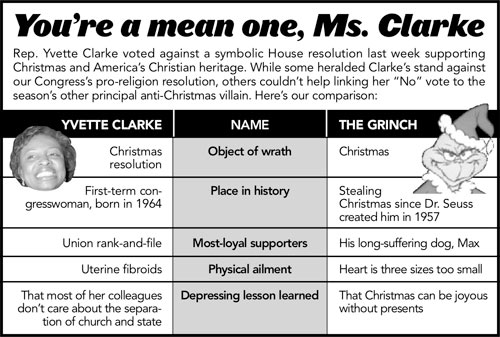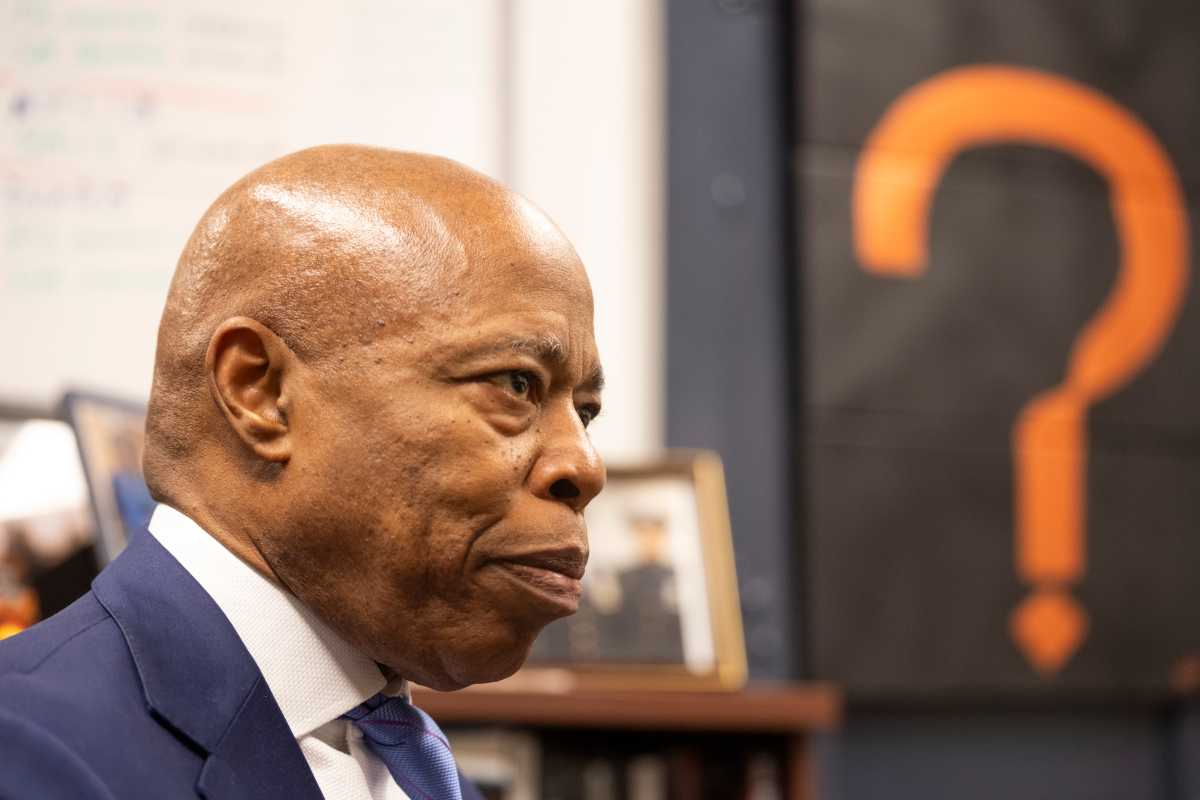Rep. Yvette Clarke voted against Christmas!
The first-term Park Slope Democrat was one of just nine members of Congress who last week voted against House Resolution 847, a symbolic bill that, among other things, acknowledged “the international religious and historical importance of Christmas and the Christian faith.”
The bill — one of dozens of purely symbolic resolutions that recognize everything from the James River as “America’s founding river” to the passing of Gerald Ford — passed last Tuesday by a vote of 372–9.
But the landslide vote masked the bill’s divisive language, including a pointed reminder that “there are approximately 225,000,000 Christians in the United States, making Christianity the religion of over three-fourths of the American population.”
It also dished up a serving of Biblical theology: “Christians identify themselves as those who believe in the salvation from sin offered to them through the sacrifice of their savior, Jesus Christ, the Son of God.” And it argued that the United States “finds much in its history that points observers back to its roots in Christianity.”
Such language drew the ire of Clarke, despite the fact that she is Christian.
“In this season of giving, love, peace and joy, I am mindful not to allow Christmas to be narrowly defined by an act of Congress,” she said in a statement. “The spirit of the holiday season … has taught me to accept the values expressed by a diverse civil society. It is the love for our collective humanity; the desire to live in a world filled with peace and joy that truly defines and unites us as Americans.”
She ended her statement with her a holiday resolution of her own that would no doubt pass unanimously: “Happy holidays and a healthy, prosperous New Year to all.”
Clarke’s objection to the Christmas resolution is somewhat surprising, given how such resolutions typically pass with overwhelming supporting — including the support of Rep. Yvette Clarke in most cases.
Earlier this year, Clarke, for example, voted for House Resolution 635 (which, as you all know, expressed “respect to Muslims in the United States and throughout the world” on the eve of Ramadan) and House Resolution 747 (which recognized “the religious and historical significance of the festival of Diwali,” an Indian holiday).
Her spokeswoman, Chic Smith, explained the Diwali vote.
“Christmas is widely recognized around the world, so this resolution was not necessary,” Smith said. “Diwali is a holiday that deserves to be more widely known.”
The symbolic resolution’s sponsor, Rep. Steve King (R–Iowa), said he was moved to act because of “an anti-Christian bias” in the nation.
He blamed the American Civil Liberties Union for eradicating Christ. “They wish [people] ‘Happy holidays,’ but not ‘Merry Christmas’ because they might be offended,” he added.
“I would not have thought that five or 10 years ago that we’d need to make a statement” affirming the importance of Christmas and Christianity, King concluded.
On that point, King might be right. The last time Congress passed a symbolic, pro-Christmas resolution, on Dec. 15, 2005, the wording was far less heated than King’s resolution.
That bill avoided making any claims about America’s Christian heritage, but specifically put the Congress on record as supporting “the importance of the symbols and traditions of Christmas,” disapproving of “attempts to ban reference to Christmas,” and tipping its hat to “those who celebrate Christmas.”
It’s not the first time Clarke has taken an unpopular stand against her congressional colleagues. Earlier this year, she was the only “no” vote on a propsal to name the library on Ellis Island after the British-born comedian Bob Hope. The bill was approved 420-1.
This time around, Clarke had company in dissent. The other eight opponents were Reps. Gary Ackerman (D–Queens); Barbara Lee, Pete Stark and Lynn Woolsey (D–California); Diana DeGette (D–Colorado); Alcee Hastings (D–Florida); Jim McDermott (D–Washington); and Bobby Scott (D–Virginia).

























